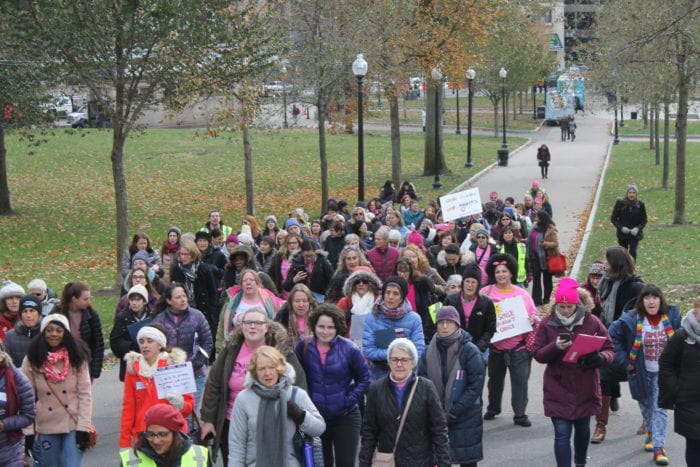
Abortion access rights will be expanded and put into law.
The Massachusetts Senate joined the House in overriding governor Charlie Baker’s vetoing of the ROE Act, an abortion access bill, on December 29. On December 24, Baker had said that he could not support legislation that would demand to lower the age of consent for an abortion to 16. Now that the historic, groundbreaking bill, which codifies abortion rights and expands access, has been passed, it will become state law.
“We are absolutely elated today that both the House and Senate moved forward with the override and that the critical provisions of the ROE Act are now law,” said executive director of NARAL Pro-Choice MA Rebecca Hart Holder. “I was deeply disappointed in Governor Baker’s veto and really tremendously grateful that both chambers of the legislature stepped up to do what’s right for the people of the Commonwealth.”
The ROE Act was created to protect young people by removing unnecessary barriers to critical care. It lowers the age at which individuals can seek an abortion without consent from a parent or judge from 18 years of age to 16. The bill also allows for abortions after 24 weeks of pregnancy in cases of fatal fetal diagnosis. While many people may previously have had to travel across the country to access an abortion in these situations, they can now receive care in Massachusetts. While young adults may have had to face unsupportive parents or navigate a difficult court system, the bill aims to protect their reproductive freedoms.
While Massachusetts in so many ways is a progressive state, Hart Holder said that it has been letting down its citizens when it comes to reproductive rights for a long time. With the appointment of Amy Coney Barrett to the Supreme Court, the future of abortion rights has been called into question, making the passage of the ROE Act even more critical.
“Globally, we are at great risk on the federal level of seeing Roe vs. Wade overturned,” said Hart Holder. “We wanted to make an unambiguous statement that in Massachusetts, we would protect the right to privacy. A lot of people are also surprised that Massachusetts was pretty much getting a ‘C’ in terms of access to abortion care. We have had on our books really pernicious laws that sent people out of state for abortion care, that create shame and stigma, that don’t give women and pregnant people the autonomy they need to make personal reproductive heath decisions. That’s not good enough, in this state.”
She added, “77% of all young people who need abortion care involve a parent. For the other 23% of can’t involve a parent, it’s because there is something unsafe happening in their household. Forcing them to go before a judge to get approval for abortion care is just wrong. Young people are capable of making decisions about reproductive health care, and they’re also smart enough to know when they can’t safely involve a parent. …We felt strongly that Massachusetts had to take a stand and erase a law that was designed to deter people from getting care when they knew that that care was the right decision for them.”
Shira Laucharoen is a reporter based in Boston. She currently serves as the assistant director of the Boston Institute for Nonprofit Journalism. In the past she has written for Sampan newspaper, The Somerville Times, Scout Magazine, Boston Magazine, and WBUR.

